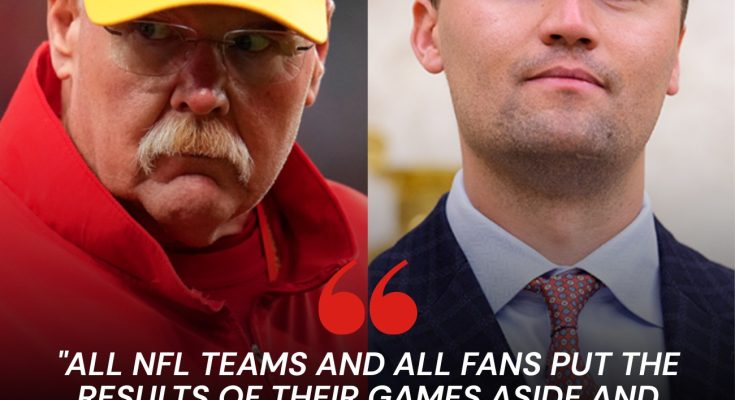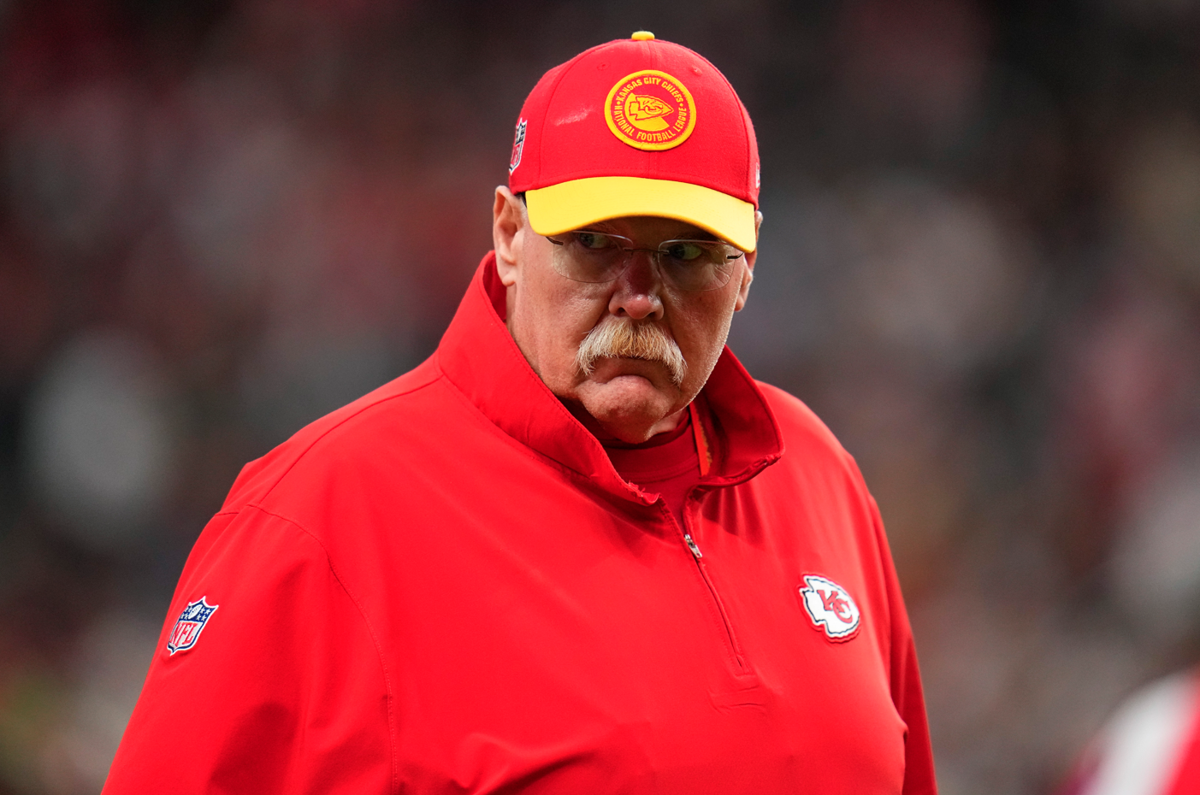
Andy Reid, the iconic head coach of the Kansas City Chiefs, has just detonated a cultural and sporting bombshell that has already set the NFL community ablaze. In a dramatic and unprecedented announcement, Reid has issued a call for a nationwide NFL tribute to Charlie Kirk, urging every team, every fan, and every player across the league to pause and remember a figure whose name embodies as much admiration as controversy. This is not simply a tribute—it is a bold, divisive, and history-making moment that promises to dominate headlines, flood social media, and ignite debates in stadiums and living rooms nationwide.
A Stunning Announcement from a Beloved Coach

Known as one of the most respected minds in football, Andy Reid has built his career on wins, championships, and an enduring ability to connect with players. But now, in his first direct foray into socio-political commentary from the NFL sidelines, Reid has stunned the sports world by asking fans and franchises to “Always Remember Charlie Kirk.” This move pushes the league into uncharted territory where football’s traditions intersect directly with America’s cultural and political divides.
The NFL has witnessed protest movements, anthem controversies, and statements from players in recent years—but a head coach of Reid’s stature demanding a league-wide tribute is nothing short of jaw-dropping. The message is clear: for Reid, remembering Kirk is not a regional or optional gesture but something that should be embedded into the DNA of the NFL itself.
Who Was Charlie Kirk and Why Now?
Charlie Kirk, a polarizing commentator and activist, passed away recently, leaving behind a legacy hotly contested in media, culture, and politics. Admired by millions as a defender of conservative values and criticized by just as many for divisive rhetoric, Kirk’s name is synonymous with America’s broader struggle over identity and discourse.
By calling for a unified NFL tribute, Reid has aligned football’s most powerful stage with the remembrance of someone who was undeniably influential—but profoundly polarizing. The timing of this announcement, right as the league prepares for key matchups and celebrations of its own storied history, underscores the magnitude of the shock. Reid has transformed a coaching platform into a cultural megaphone.
Reactions: A Firestorm of Praise and Condemnation

Supporters immediately rushed to celebrate Reid’s courage. “This is more than football—it’s history,” one fan tweeted. “Andy Reid understands that the NFL represents America, and America cannot ignore Charlie Kirk’s legacy.” In Kansas City and across conservative circles, Reid is hailed as a hero for daring to intertwine memory, politics, and sport.
Yet critics are equally loud in their condemnation. “The NFL is supposed to be about unity, not division,” blasted one ESPN analyst. Social media campaigns erupted within minutes, with hashtags like #NFLDivided and #KeepPoliticsOutOfFootball trending at the top. Detractors accuse Reid of hijacking game day to promote a specific ideology, warning that such a precedent could turn football from a unifying arena into another battlefield of America’s cultural wars.
NFL in Crisis: Neutrality Shattered
The league office now finds itself staring into the heart of a storm it cannot ignore. An NFL-wide tribute to Charlie Kirk would fundamentally redefine the way the league engages with politics, memory, and culture. Commissioner Roger Goodell, long cautious about navigating political minefields, faces a nearly impossible choice: embrace Reid’s call and risk alienating millions, or reject it and risk appearing insensitive to a popular coach and significant portion of the fanbase.
This announcement punctures any illusion of the NFL as a neutral cultural force. It demonstrates once again that America’s biggest sports platform doubles as a mirror to its deepest divisions. The question is not simply whether Kirk deserves recognition—it’s whether the NFL can survive the weight of politicized remembrance.
Players and Teams: Torn Between Loyalty and Principle
The ripple effects are spreading rapidly across locker rooms. Many players admire Reid’s leadership and feel pressure to support his call. Others, however, express discomfort at being asked to endorse a figure whose ideology they may not share. The Players Association remains silent for now, but insiders suggest a growing unease that players will be forced into political expression against their will.
Franchise owners, too, are caught in the crossfire. Should they join Reid in promoting the tribute or withhold involvement to preserve fanbase unity? Teams with politically diverse fan populations—like those in New York, Los Angeles, and Chicago—face a powder keg scenario, where choosing sides could mean fracturing their support at the gates and on the airwaves.
Fans React: Unity and Division on Steroids
The heartbeat of the NFL—its fans—has also found itself split down the middle. In Kansas City, many supporters rally behind Reid, planning demonstrations of solidarity that will likely dominate Arrowhead Stadium in upcoming games. But in other cities, fan groups vocally oppose the idea of seeing their teams associate directly with Kirk’s memory.
Debates rage across Twitter, Facebook, and TikTok, where viral clips of Reid’s press announcement are spurring thousands of arguments. Families, communities, and fan forums are locked in heated exchanges, as the call for remembrance of Charlie Kirk mutates into the season’s most divisive off-field storyline.
Implications for the Future of Sports Culture
Reid’s announcement is not just about one man—it is about the evolving role of professional sports in American culture. Once seen primarily as entertainment, leagues like the NFL now wield immense cultural power. By demanding a national tribute, Reid is highlighting that football is no longer just a game but a platform for national identity, dialogue, and sometimes confrontation.
If such tributes become common, the NFL could transform into a stage where political and ideological legacies are debated as fiercely as touchdowns and Super Bowls. The risk? Alienating large swaths of fans who just want football to remain football. The opportunity? Expanding the NFL’s cultural significance into something larger than sport.
What Happens Next?
With millions already engaged in ferocious conversation, what comes next is uncertain—and explosive. Will Goodell and league leadership sanction an official tribute? Will other coaches and owners rally around Reid, or distance themselves quickly? Could franchises fracture internally if coaches and players disagree about participation?
This storyline is poised to dominate not only sports coverage but also political commentary, with news media across the ideological spectrum weighing in. Every upcoming NFL game is now overshadowed by the question of memory: do fans raise their voices to “Always Remember Charlie Kirk,” or reject the initiative outright?
Conclusion: A Defining Crossroads for the NFL
Andy Reid’s call for a nationwide tribute to Charlie Kirk marks a turning point in football history. It represents not just an homage but a crisis, a chance, and a challenge all at once. Will the NFL embrace this commemorative moment and transform itself into a cultural institution that enshrines controversial legacies? Or will it pull back, seeking to shield itself from further division?
Either way, the league will never again be able to claim innocence or neutrality in America’s culture wars. Reid has thrown down the gauntlet, and the NFL—as well as its millions of fans—must pick it up.
This is not just about football. It is about who we remember, how we remember, and why remembrance matters at all. And as the NFL stares into this storm, one question lingers louder than the rest: is the league ready for the fire Reid has lit? Because the nation is already watching, already debating, and already taking sides.